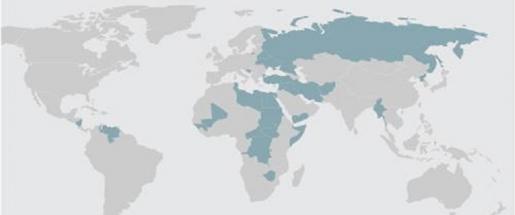Protection of European businesses under EU sanctions
The European Union's 'no-claims clause' is reshaping international commerce amidst geopolitical tensions. Designed to shield businesses from claims when adhering to EU sanctions, it offers both protection and new market opportunities.

Transacting Under the Shield: How EU Sanctions Protect European Firms from Legal Challenges
In recent years, the European Union (EU) has been at the forefront of implementing robust strategies to shield its business entities from potential legal ramifications stemming from their adherence to EU sanctions. Central to this proactive approach is the implementation of a 'no-claims clause'. This clause, which has become a staple provision within the Council Regulations that lay down these sanctions, serves as a protective shield for business operators.
Here's a deeper dive into the specifics:
- No-Claims Clause and Its Purpose: This specially designed clause stands as a bulwark against claims, primarily from certain third parties such as entities from Russia and individuals or organizations listed by the EU. The essence of this clause is to ensure that companies abiding by the EU's stipulated sanctions are not financially or legally penalized for their compliance.
- Nature of Claims: The EU recognizes that sanctions can inadvertently disrupt the regular flow of business, especially in cases where a contract or a transaction is detrimentally impacted by the sanctions' directives. Claims may arise seeking indemnity or financial compensation in any form due to these disruptions. However, the 'no-claims clause' ensures that such claims are nullified, offering businesses a layer of immunity.
- Guidance and Information: To ensure that there's no ambiguity or confusion, the European Commission goes the extra mile by disseminating regularly updated guidance on the enforcement and implications of these regulations. This guidance, often encapsulated in a Frequently Asked Questions (FAQ) format, ensures businesses are never in the dark about their responsibilities or the protections afforded to them.
- Decision-making Power: It's imperative to note that the authority to impose new sanctions or modify existing ones is vested exclusively with the Council of the European Union. This body, emphasizing collective decision-making, operates based on unanimity.
In conclusion, the European Union's comprehensive strategy not only underscores its commitment to ensuring businesses are protected from external pressures but also reinforces its stance on sanctions and the pivotal role they play in the larger geopolitical landscape. Businesses operating within the EU can take solace in the fact that they are both guided and shielded as they navigate the intricacies of international commerce in an era of sanctions.
EU's 'No-Claims Clause': A Groundbreaking Pivot in Global Commerce and Sanctions Landscape
In today's globalized business ecosystem, where commerce crisscrosses boundaries and geopolitical tensions can swiftly change the rules of the game, the European Union (EU) has ushered in a paradigm shift with its innovative 'no-claims clause'. As companies strive to maintain a competitive edge in international markets, understanding and leveraging this clause could be pivotal.
Deciphering the 'No-Claims Clause' and Its Genesis in the EU:
Sanctions, though instrumental in geopolitics, often inadvertently hamstring businesses, making international transactions a tightrope walk. The 'no-claims clause', intricately woven into the EU's Council Regulations, is the bloc's visionary response. This protective mechanism ensures that businesses diligently complying with EU sanctions aren't left vulnerable to claims, especially from entities in regions under the EU's sanctions microscope, like Russia.
The Potential Game-Changers for International Commerce:
- Broadening Market Avenues: Empowered by the 'no-claims clause', European businesses have an avenue to venture into markets they previously deemed high-risk. This can lead to enhanced market diversification and richer business portfolios.
- Redefining Risk Metrics: With the protective layer of the clause, companies can revisit and recalibrate their risk assessment frameworks, making data-driven decisions rather than being paralyzed by sanction fears.
Yet, there are inherent complexities:
- Layered Compliance Challenges: The dual necessity to comprehend sanction details and the protective scope of the 'no-claims clause' means businesses have to be doubly diligent. Any oversight can lead to compliance breaches, bearing reputational and financial repercussions.
- Operational Overhauls: Financial entities, spanning banks, insurers, investment firms, and more, may need to undergo strategic shifts, integrating compliance checks seamlessly into their transaction workflows.
The Ripple Effect on Global Trade Dynamics: The EU's forward-thinking measure might set the ball rolling globally. If other major trade blocs and nations interpret the 'no-claims clause' as a template, we might witness:
- Global Protective Mechanisms: Countries might institute their protective clauses, fostering a more secure global trade environment.
- Enhanced Cross-Border Collaborations: With protective mechanisms in place, international joint ventures and partnerships might see an uptick.
Harnessing the European Commission's Guidance:
To navigate this intricate landscape, the European Commission's role is pivotal. Their frequently updated guidance, a beacon for businesses, ensures that ambiguity doesn't muddy the waters. Staying abreast with these updates is paramount for businesses seeking to leverage opportunities while remaining compliant.
The 'no-claims clause', while initially an EU-centric measure, has the potential to reshape the contours of global commerce. As businesses adapt and the world possibly inches towards a new norm in international trade, staying informed, agile, and SEO-optimized is the mantra for success.
Read More

Reduce your
compliance risks

